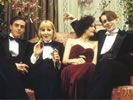Eye For Film >> Movies >> Bright Young Things (2003) Film Review
Stephen Fry's directorial debut is hectic from the start, full of jazz and glitter, flashing cameras and snapping heels; it effectively captures an outsider's perspective on the glamour of pre-Second World War English high society.
We begin with an outsider, a young journalist who sees his chance to grab a fallen ticket and goes for it, leaping over walls and fences, abandoning his coat in the process. When things like that happen in films, they always make me nervous. I'm sitting there waiting for the coat to be retrieved, for the heroine of The Hours to remember to feed her friend's dog, for the pizza in Phone Booth to find a home. In this case, the coat is lost as a daring escape is made; but that's intentional, no oversight; this whole story is built around characters who drop things and forget about them, characters who have too much money to realise what anything's worth; it sets the scene nicely.

Of course, the young hero, Adam, charmingly played by Stephen Campbell Moore, has no money, despite his acceptance by the in-crowd, so it is through his eyes that we are able to see what really goes on with some realistic perspective. Adam is besotted with media darling Nina (Emily Mortimer), who is in love with him but is worried about her long-term financial security. His efforts to acquire money and hold onto it form the backbone of the plot, but this isn't really a film about plot; the atmosphere is more important, and it is here that Fry really scores. Doubtless his own jaded familiarity with trying to get on with life amid media intrusions has contributed to his ability to build up a believable portrait of this group of bright young things growing up in public. The parties are lush and fantastic, the costumes spectacular, personal lives suitably miserable and mundane.
The biggest flaw this film suffers from is that Fry is too sympathetic to his glamourous characters. The original story comes, of course, from Evelyn Waugh's novel Vile Bodies, and nobody here is quite vile enough. There's betrayal and heartache, unrequited love, desperation and suicide, but the humour with which the party keeps going is never quite vicious enough.
We hear about the alliance between bright young things and old survivors, yet never see enough of what makes that survival possible. The party ends in time, and we are certainly made aware of the damage done; also, of the hostile world in which these young liberals live. Fry's previous performance as Oscar Wilde brings added pathos to the story of Miles (Michael Sheen) who is forced to leave the country after his homosexuality is exposed. Nevertheless, there is little sense of emotional reckoning with what has happened between these people. Adam is portrayed as being capable of it, but he too retains a certain innocence even through the horrors of war. It's one thing to make a film about innocence, another to leave the audience in the same condition.
Bright Young Things will doubtless appeal very strongly to foreign audiences charmed by stereotypical Englishness, even though Dan Aykroyd's wonderful Lord Monomark offers some cutting insights into that; it does create an intense sense of period and it has a fabulous cast. Jim Broadbent is perfect as blatantly surreal deus ex machina the Major, and Peter O'Toole seems to be having immense fun as Nina's intractable father Colonel Blount.
Fry himself appears briefly as an embittered right wing taxi driver, and we also see cameos from Simon Callow, Hugh Laurie, Sir John Mills, Imelda Staunton and Richard E Grant. Mortimer is glorious as Nina, with a fierce intelligence behind her Daisy Fay demeanour. These performances make it possible to care even in the absence of character depth. Bright Young Things is definitely worth watching, if not quite as edgy as it should have been.
Reviewed on: 27 Jun 2007




















